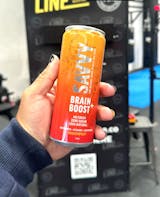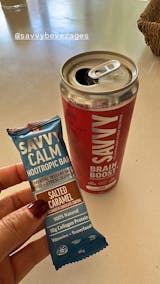MCT FAST FACTS:
- MCT powder is a healthy fat that turns into a unique energy source called ketones
- It is evident that MCT supplementation enhances brain power among other benefits
- Direct research on the effects of MCT supplementation, including the active forms (forms utilised by goMCT as well), Capric acid, and Caprylic acid on the brain is highlighted in this document.
- In addition, the paper cites indirect evidence of MCT's positive effects on the brain. That is, while the direct effect of MCT supplementation on increasing ketone levels is discussed, additional publications that explain the effect of the ketogenic diet on improving brain capacity are also included for a better link.
- However, there aren’t too many studies that specifically demonstrate the effect of capric acid or caprylic acid on the brain.
Introduction
Medium-chain triglyceride oil or MCT oil contains medium-length chains of fats called triglycerides. Due to their shorter length, they are more easily digested than longer-chain fatty acids found in many other foods. MCT oil is most commonly extracted from coconut oil, as more than 50% of the fat in coconut oil comes from MCTs. These fats are also found in other foods, such as palm oil and dairy products. Four different types of MCTs exist, of which caprylic and capric acid are most commonly used for MCT oil. In some cases, these specific types have unique benefits. In spite of their natural occurrence, they are also manufactured for their value as a healthier dietary fat. The oil has been used as a supplement that has become popular among athletes and bodybuilders.
Active compounds
There are a few main types of medium-chain fatty acids that are defined by the length of their aliphatic tail:
Caproic acid or hexanoic acid (C6)
As the shortest MCT with six carbons in its aliphatic tail, caproic acid metabolizes very quickly. Because it can have an unpleasant taste or smell, caproic acid is typically removed during the manufacturing of MCT oil.
Caprylic acid or octanoic acid (C8)
Because of its anti-microbial properties, caprylic acid is effective for maintaining a healthy gut. Caprylic acid is the second most efficient MCT after caproic acid but does not have an offensive taste or smell. For this reason, caprylic acid is often the primary MCT used in MCT oil.
Capric acid or decanoic acid (C10)
While capric acid metabolizes a bit slower than caprylic acid, it still turns into ketones very quickly in the liver. Capric is the other most common MCT used for MCT oil.
Lauric acid or dodecanoic acid (C12)
Lauric acid makes up most of the MCTs in coconut oil, however, it is often removed from MCT oil. Compared to other MCTs, lauric acid is the slowest to metabolize but still provides anti-microbial properties and other health benefits.
Recommended dose
A wide range of MCT dosages has been used in studies, from about five to 70 grams daily (or 0.17–2.5 ounces) depending on the person’s goals. Although MCT oil doesn’t have a defined tolerable upper intake level (UL), a maximum daily dose of 4–7 tablespoons (60–100 mL) has been suggested. While it’s also not clear what dose is needed to obtain potential health benefits, most studies conducted have used between 1–5 tablespoons (15–74 mL) daily. There are currently no reported adverse interactions with medications or other serious side effects. However, some minor side effects have been reported, including nausea, vomiting, diarrhoea, and an upset stomach. These can be avoided by starting with small doses, such as 1 teaspoon (5 mL) and increasing intake slowly. Once tolerated, MCT oil can be taken by the tablespoon.
While the recommended dose and safety of capric acid is not known, the appropriate dose of caprylic acid depends on several factors such as the user's age, health, and several other conditions. From research, there is not enough scientific information to determine an appropriate range of doses for caprylic acid. The acid is likely safe when taken in food amounts and possibly safe when taken by mouth as a medicine for a short period of time. While Caprylic acid has been safely used at daily doses of 16 mg/kg for 20 days, side effects may include nausea, bloating and diarrhoea.
General benefits of MCT oil
- Promotes weight loss
- Could act as a good energy source
- Reduces lactate build-up in athletes and helps use fat for energy
- Helps manage conditions like epilepsy, Alzheimer’s disease and autism
- Has antimicrobial and antifungal effects
- Reduces the risk of heart disease
- Helps manage blood sugar level
- Improves exercise performance
Main benefits for savvy
- Enhances cognition
- Protects the brain and prevents neurodegenerative diseases
- Improves working memory
- Controls seizures
1. Enhances cognition
- Rebello, Candida J, et al. ‘Pilot feasibility and safety study examining the effect of medium chain triglyceride supplementation in subjects with mild cognitive impairment: a randomized controlled trial.’ BBA clinical. Volume 3. 2015. Pp. 123-125.
[https://www.sciencedirect.com/science/article/pii/S2214647415000021]
This study examined the potential of medium-chain triglyceride supplementation in increasing circulating ketone bodies, to beneficially modulate brain homeostasis. Consumption of 56 g/day of MCTs for 24 weeks increased serum ketone concentrations and appeared to be a candidate for future studies to quantify the modulation of cognitive function through supplementation with ketone precursors, in patients with MCI. Intake of MCT oil increased serum ketone bodies and improved memory, while intake of placebo did not show improvement in any of the cognitive measures tested.
- Ashton, Jake S, et al. ‘The effects of medium chain triglyceride (MCT) supplementation using a C8: C10 ratio of 30: 70 on cognitive performance in healthy young adults.’ Physiology & Behavior. Volume 229. 2021. Pp. 113252.
[https://www.sciencedirect.com/science/article/pii/S0031938420305667]
The aim of this study was to determine if MCT at a ratio of 30:70 (C8:C10) improved cognitive function in young, healthy adults. The results identified that MCT ingestion improved cognitive performance after 2–3 weeks, with minimal difference between taking 12 g and 18 g MCT/day groups, suggesting a possible dose-response threshold at 12 g MCT/day when supplementing over a short period.
- Klement, Rainer J, et al. "A ketogenic diet consumed during radiotherapy improves several aspects of quality of life and metabolic health in women with breast cancer." Clinical Nutrition. 2021.
[https://www.sciencedirect.com/science/article/pii/S0261561421000479]
In this study, comparing standard diet, intake of the ketogenic diet experienced improvements in emotional functioning, social functioning, sleep quality, future perspectives and systemic therapy side effects, thereby enhancing the quality of life.
2. Protects the brain and prevents neurodegenerative diseases
- Taylor, Matthew K, et al. ‘Feasibility and efficacy data from a ketogenic diet intervention in Alzheimer's disease.’ Alzheimer's & Dementia: Translational Research & Clinical Interventions. Volume 4. 2018. Pp. 28-36.
[https://www.sciencedirect.com/science/article/pii/S2352873717300707]
This study assessed the feasibility and cognitive effects of ketogenic diet (KD) in participants with Alzheimer's disease. Among the completers, the mean of the Alzheimer's Disease Assessment Scale-cognitive subscale score improved by 4.1 points during the diet and reverted to baseline after the washout.
- Avgerinos, Konstantinos I, et al. ‘Medium chain triglycerides induce mild ketosis and may improve cognition in Alzheimer’s disease. A systematic review and meta-analysis of human studies.’ Ageing research reviews. Volume 58. 2020. Pp. 101001.
[https://www.sciencedirect.com/science/article/pii/S156816371930131X]
The aim of the meta-analysis study was to investigate the effect of MCTs on peripheral ketone levels and cognitive performance in patients with mild cognitive impairment and Alzheimer’s disease. It was demonstrated that MCTs can induce mild ketosis and may improve cognition in patients with mild cognitive impairment and Alzheimer’s disease.
- Rho, Jong Min, and Carl E. Stafstrom. ‘The ketogenic diet as a treatment paradigm for diverse neurological disorders.’ Frontiers in pharmacology. Volume 3. 2012. Pp. 59.
[https://www.frontiersin.org/articles/10.3389/fphar.2012.00059/full]
This review highlighted the effects of the ketogenic diet on neurological diseases including epilepsy, headache, neurotrauma, Alzheimer disease, Parkinson disease, sleep disorders, brain cancer, autism, pain, and multiple sclerosis. While the exact mechanism for the neuroprotective action remains unclear, the concept that many neurological conditions are linked pathophysiologically to energy dysregulation could well provide common research and experimental therapeutics platform, from which the course of several neurological diseases could be favourably influenced by dietary means.
- Juby, Angela G, et al. ‘Assessing the Impact of Factors that Influence the Ketogenic Response to Varying Doses of Medium Chain Triglyceride (MCT) Oil.’ The Journal of Prevention of Alzheimer's Disease. Volume 8. Issue 1. 2021. Pp. 19-28.
[https://link.springer.com/article/10.14283/jpad.2020.53]
The ketogenic effect of medium chain triglyceride (MCT) oil offers potential for Alzheimer’s disease prevention and treatment. Limited literature suggests a linear B-hyroxybutyrate (BHB) response to increasing MCT doses. This pharmacokinetic study evaluates factors affecting BHB response in three subject groups. Different doses (0g,14g, 28g, 42g) of MCT oil (99.3% C8:0) were administered, followed by fasting during the study period. There was a large inter-individual variability, with phenotype effects identified. This highlights challenges in interpreting clinical responses to MCT intake.
- Schwartz, Kenneth A, et al. ‘Investigating the ketogenic diet as treatment for primary aggressive brain cancer: challenges and lessons learned.’ Frontiers in nutrition. Volume 5. 2018. Pp. 11.
[https://internal-journal.frontiersin.org/articles/10.3389/fnut.2018.00011/full]
This review investigated a clinical trial that enrolled 15 subjects using a ketogenic diet as an addition to current standard treatments that include surgery, radiation therapy, and chemotherapy. In vitro and in vivo animal studies suggested that the ketogenic diet has the potential to augment the treatments currently available for patients with aggressive gliomas.
- Newport, Mary. ‘Review of Strategies to Overcome Brain Insulin Resistance Through Mild Nutritional Ketosis for Alzheimer's and Mild Cognitive Impairment.’ Current Developments in Nutrition. Volume 5. Issue Supplement_2. 2021. Pp. 912-912.
[https://academic.oup.com/cdn/article/5/Supplement_2/912/6292970?login=true]
This review concentrated on Clinical trials and case studies that have positive results using medium-chain triglyceride (MCT) oil, coconut oil (source of MCT oil), Ketogenic Diet (KD), or ketone ester in people with mild cognitive impairment and Alzheimer’s Disease. KD improved biomarkers of insulin resistance in people with type 2 diabetes. Two people with mild AD had improved insulin-resistance biomarkers and normalization of MoCA cognitive test after 10 weeks of KD. A study of 65 people taking MCT oil of 30 gm/day for 6 months vs. placebo documented increased brain energy from ketones and cognitive improvement, without change in lipid profile or serious adverse effects. A study of 53 people with mild to moderate AD taking MCT oil 6 gm 3 x daily for 30 days reported improved cognition and lipid metabolomics.
- Chatterjee, Pratishtha et al. ‘Potential of coconut oil and medium chain triglycerides in the prevention and treatment of Alzheimer’s disease.’ Mechanisms of ageing and development. Volume 186. 2020. Pp. 111209.
[https://www.sciencedirect.com/science/article/pii/S0047637420300038]
“Coconut oil, MCT and their derivatives show evidence of neuroprotective properties.
CO, MCT and their derivatives show evidence of influencing Alzheimer’s Disease-related risk factors.”
3. Improves working memory
- Shcherbakova, Ksenia et al. ‘Acute and chronic effects of medium-chain triglyceride supplementation on metabolic parameters and working memory in rats.’ In Presented at the 1st International Electronic Conference on Biomedicine. Volume 1. 2021. Pp. 26.
[https://sciforum.net/manuscripts/10282/manuscript.pdf]
In this research study, Male Wistar rats aged 2.5 months received (o/g) 3 g/kg/day of MCT oil, lard, or water (control) as a supplement to standard chow for 28 days. The results concluded that daily supplementation of standard feed with MCT led to mild intermittent ketosis and improved working memory in rats. Neither chronic nor acute MCT administration had any adverse effect on metabolic health markers.
- Bisong, Sunday A, et al. ‘Long-term consumption of virgin coconut (Cocos nucifera) oil diet impairs learning and memory in CD1 mice.’ Chinese Herbal Medicines. Volume 12. Issue 4. 2020. Pp. 414-420.
[https://www.sciencedirect.com/science/article/pii/S1674638420300770]
“Virgin coconut oil has a high content of medium chain triglycerides (MCTs), which can be easily converted by the liver to ketones (ketogenic diet). Since VCO is a ketogenic diet, its consumption would result in increased availability of ketone bodies for brain metabolism, thereby tentatively restoring brain function and improving memory.
Ketogenic diets have been reported to reduce the amount of Alzheimer’s-like plaques that form in the brain and improve performance on visual-spatial memory tasks, increase the ability of learning tasks, and improve performance in short-term memory tests”
4. Controls Seizure
- Chang, Pishan, et al. ‘Seizure control by decanoic acid through direct AMPA receptor inhibition.’ Brain. Volume 139. Issue 2. 2016. Pp. 431-443.
[https://academic.oup.com/brain/article/139/2/431/1753724?login=true]
This research paper identified the mechanism by which decanoic acid provides seizure control in vivo. The results showed that decanoic acid shows antiseizure activity in two acute ex vivo rat hippocampal slice models. The mechanism of action was identified to be as follows: direct inhibition of excitatory neurotransmission by decanoic acid in the brain, contributing to the anticonvulsant effect of the medium chain triglyceride ketogenic diet.
- Fortier, Mélanie et al. ‘A ketogenic drink improves brain energy and some measures of cognition in mild cognitive impairment.’ Alzheimer's & Dementia. Volume 15. Issue 5. 2019. Pp. 625-634.
[https://www.sciencedirect.com/science/article/abs/pii/S1552526019300111]
In this study, a dose of 30 g/day of ketogenic medium chain triglycerides (kMCT) taken for 6 months bypassed a significant part of the brain glucose deficit and improved several cognitive outcomes in mild cognitive impairment (MCI). Brain ketone metabolism increased by 230% for subjects on the kMCT.
- Chang, Pishan, et al. ‘Seizure control by derivatives of medium chain fatty acids associated with the ketogenic diet show novel branching-point structure for enhanced potency.’ Journal of Pharmacology and Experimental Therapeutics. Volume 352. Issue 1. 2015. Pp. 43-52.
[https://jpet.aspetjournals.org/content/352/1/43.short]
The study investigated structural variants of branched medium-chain fatty acids, octanoic acid in acting as a new seizure-control treatment. Through the results, it was concluded that the study identified a novel family of fatty acids, related to the MCT ketogenic diet, that showed promise as a new treatment for epilepsy control and possibly other MCT ketogenic diet-responding conditions, such as Alzheimer disease.
- Augustin, Katrin et al. ’Mechanisms of action for the medium-chain triglyceride ketogenic diet in neurological and metabolic disorders.’ The Lancet Neurology. Volume 17. Issue 1. 2018. Pp. 84-93.
[https://www.sciencedirect.com/science/article/pii/S1474442217304088]
This review paper summarised the seizure reducing effects of decanoic acid and octanoic acid, along with the mechanisms of action. It was found that decanoic acid has a direct mechanism in the control of seizures and octanoic acid exerts an indirect mechanism of anti-seizure activity by modulating adenosine receptors.
- Han, Felicity Y, et al. ‘Dietary medium chain triglycerides for management of epilepsy: new data from human, dog, and rodent studies.’ Epilepsia. Volume 62. Issue 8. 2021. Pp. 1790-1806.
[https://onlinelibrary.wiley.com/doi/full/10.1111/epi.16972]
“More recent data demonstrate that addition of medium chain triglycerides (MCTs), which provide the medium chain fatty acids octanoic and decanoic acid, as well as ketone bodies as auxiliary brain energy, can be beneficial in rodent seizure models, and dogs and humans with epilepsy. Here, this evidence is reviewed, including tolerance in 65% of humans, efficacy studies in dogs, possible anticonvulsant mechanisms of actions of MCTs, and specifically decanoic acid as well as metabolic and antioxidant mechanisms.”
- Azzam, Raed, and Nabil J. Azar. ‘Marked seizure reduction after MCT supplementation.’ Case reports in neurological medicine. Volume 2013. 2013.
[https://www.hindawi.com/journals/crinm/2013/809151/]
“We conclude that MCT oil supplementation to the regular diet may provide better seizure control in some patients.”
Effect on mood
d C Harvey, Cliff J, et al. ‘The effect of medium chain triglycerides on time to nutritional ketosis and symptoms of keto-induction in healthy adults: a randomised controlled clinical trial.’ Journal of nutrition and metabolism. Volume 2018. 2018.
[https://www.hindawi.com/journals/jnme/2018/2630565/]
This study investigated whether MCT supplementation improves time to nutritional ketosis (NK), mood, and symptoms of keto-induction. There was a possibly beneficial effect on symptoms by MCT, but the effect on mood was unclear. Based on these results, MCTs increased BOHB compared with LCT and reduced symptoms of keto-induction. It was unclear whether MCTs significantly improved mood or time to NK. The trial was registered by the Australia New Zealand Clinical Trial Registry.




